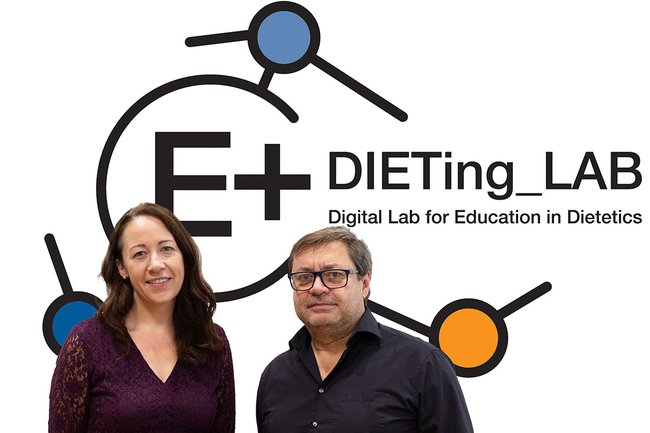AI and Avatars in Dietetics Education
Conclusion of a Successful European Project: the “E+DIETing_LAB”

The “Digital Lab for Education in Dietetics” based on artificial intelligence builds a bridge between a professionally and scientifically excellent education for dietitians and their everyday professional practice. In this EU project, an international team of dietitians and IT experts developed a digital platform with virtual avatars for the advisory practice of dietitians – the E+DIETing_Lab. With the help of these avatars, students can train their counselling skills before using them on real patients. Dietitians of the St. Pölten University of Applied Sciences played a leading role in the project.
Three years of intensive collaboration between six European institutions resulted in three innovative outcomes: a virtual patient chatbot platform, a virtual clinic, and an information toolkit. These now enrich the training of dietitians and support public health initiatives in Europe.
More than 1,000 People from Five Countries Involved
“The project directly involved over 1,000 participants from Austria, Spain, Belgium, Poland, and Portugal. Among them were students, lecturers, dietitians, and members of the community. Higher education institutions and health organisations worldwide have already declared their interest in introducing the tools we have developed”, explains UAS lecturer Johann Grassl who executed the project at the St. Pölten UAS’ Department of Health Sciences together with researcher Elise Mandl.
“This project attests to the power of European collaboration”, says Thomas Prola, Project Manager at the European University of the Atlantic. “By means of transnational cooperation, we have developed instruments that will assist the next generation of dietitians in learning and promoting a healthier society.”
Virtual Patients and Clinic
One of the project’s outstanding achievements is the virtual patient chatbot platform – a self-study platform for dietetics students that is unique in the world. It allows for simulated dietetic counselling with virtual patients suffering from adiposity, diabetes, or coeliac disease. It comes in six different languages and offers students a safe environment where they can train anamnesis, nutrition protocol, and clinical argumentation in a practice-oriented manner.
“The platform connects theory and practice in a way that gives the students confidence and prepares them for real interactions”, states Elisa Mandl, Junior Researcher at the St. Pölten University of Applied Sciences.
The chatbot platform is complemented by the virtual clinic which gives students the opportunity to carry out telemedical consultations with both real or simulated patients under professional supervision. During the pilot phase, 270 participants – including students, teachers, and members of the community – took part in the virtual dietetic counselling sessions.
Raising Awareness on Healthy Habits
More than 75% of the community members said that they had a better understanding of healthy habits following the counselling. “The students really put their acquired knowledge into practice here”, emphasises Johann Grassl, lecturer of Dietetics at the St. Pölten UAS. “The feedback from real counselling situations helps them to further refine their skills.”
A particular advantage of the virtual clinic lies in its capability to transform real consultations into virtual patient cases for the future. This ensures the learning resources’ continuous growth.
Long-Term Effect and Sustainable Integration into Training
In order to guarantee the long-term application of the developed resources, a comprehensive information package including practical instructions, reports, and recommendations for curricula was developed. This toolkit supports higher education institutions and organisations in the long-term implementation of digital learning methods, always with consideration for their technical implementation and for data protection guidelines.
The project is intended to continue to take effect after its conclusion. The project partners have undertaken to further develop the virtual patient platform and the virtual clinic and to make them available for at least three more years.
International Recognition
Moreover, the project’s success has been recognised at the international level: The E+DIETing_LAB won first place in the category “People’s Choice” of the European and American “Triple E Awards” for the EDI Community Engagement Initiative on Equity, Diversity, and Inclusion.
The “Triple E Awards” are a globally recognised distinction for entrepreneurship and social commitment in higher education. They focus on the ‘third mission’ of universities and are given away to institutions with outstanding performances in these fields. The prizes are awarded by the Accreditation Council for Entrepreneurial and Engaged Universities (ACEEU), a globally leading organisation which first developed an accreditation for entrepreneurship and engagement at an institutional level.
Project “E+DIETing_LAB- Digital Lab for Education in Dietetics combining Experiential Learning and Community Service“
The E+DIETing_Lab was funded within the framework of the EU programme Erasmus+. It was coordinated by the European University of the Atlantic (Spain) with the St. Pölten UAS, the University of Valladolid (Spain), the University of Porto (Portugal), the AP Hogeschool Antwerp (Belgium), and the Jan Kochanowski University of Kielce (Poland) as partners.

Johann Grassl
UAS Lecturer for Teaching and Practice International Coordinator Department of Health Sciences